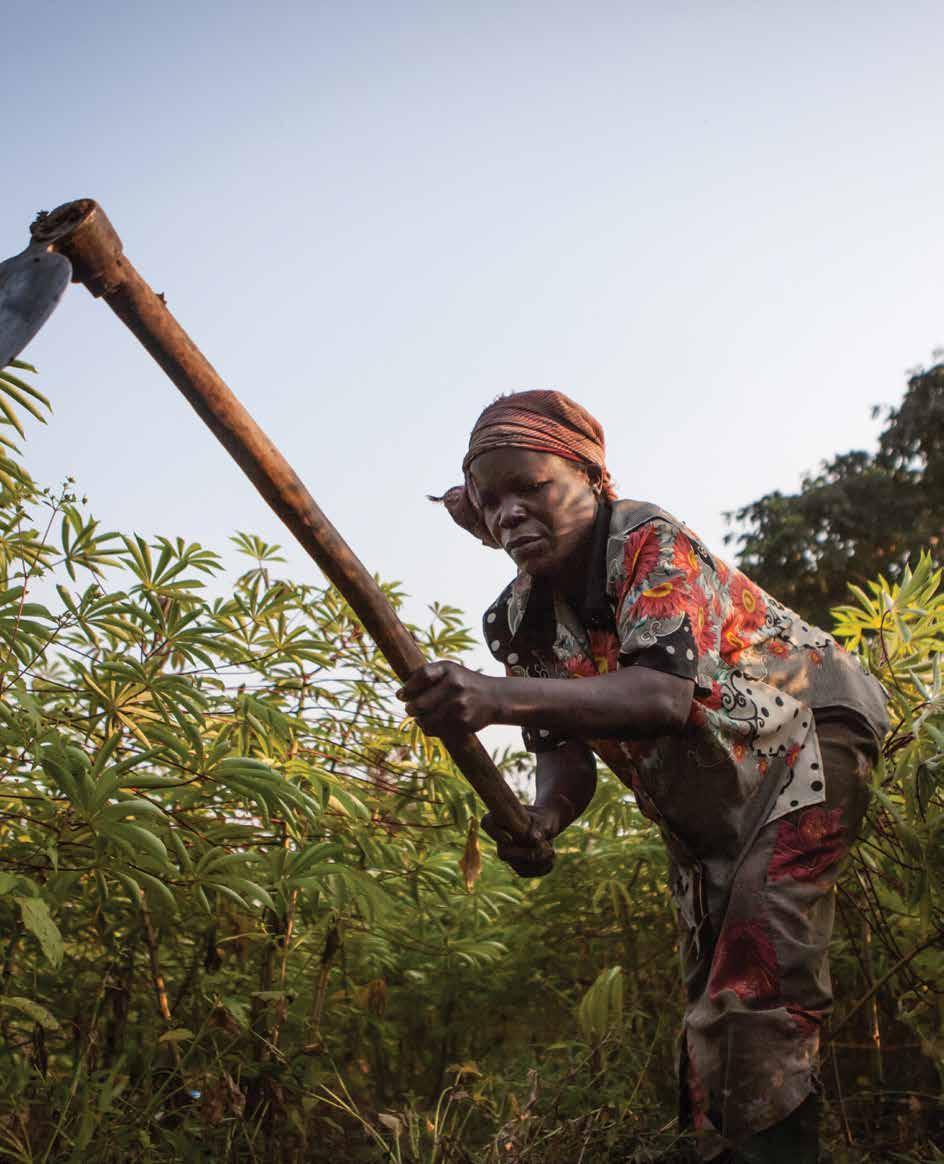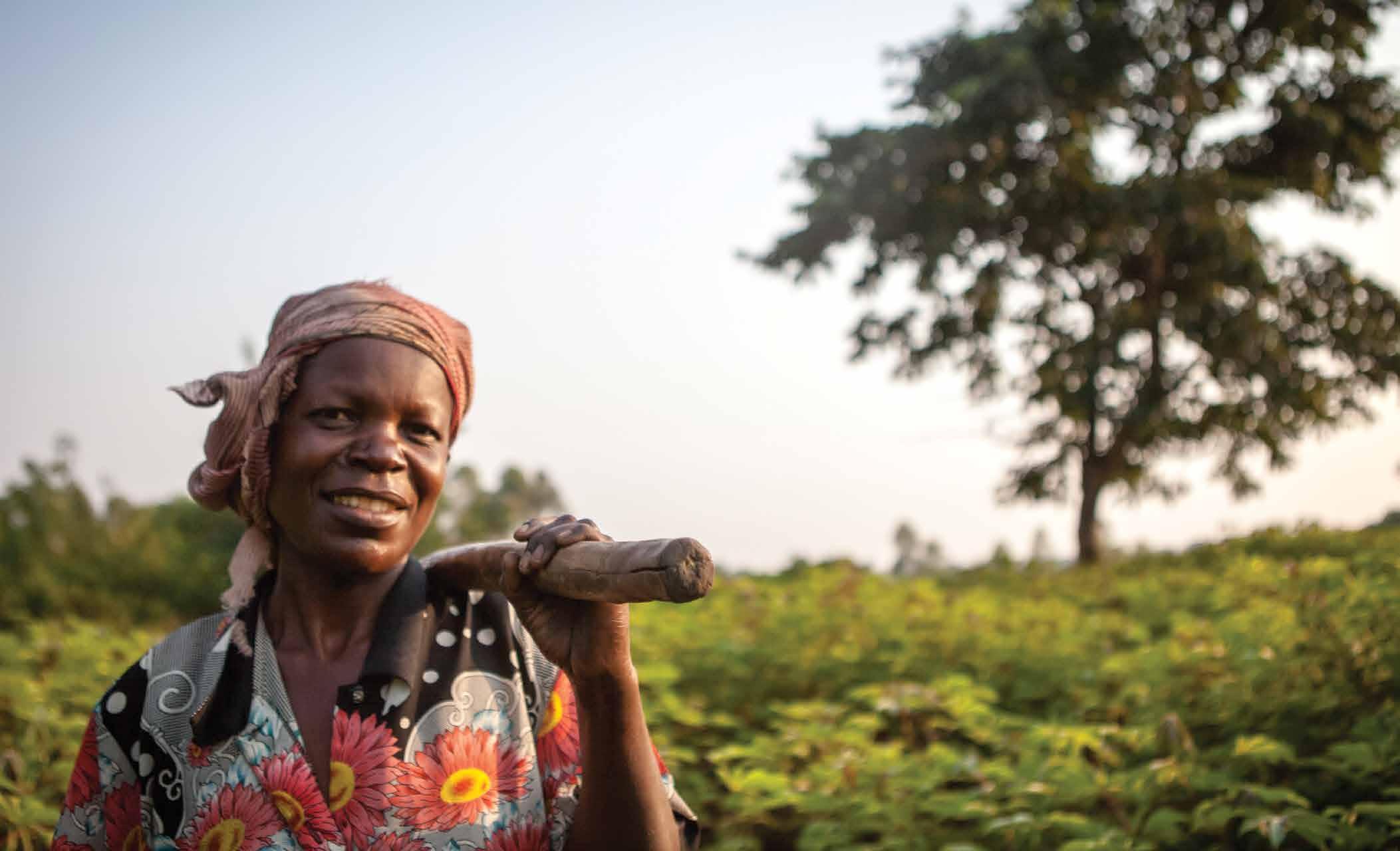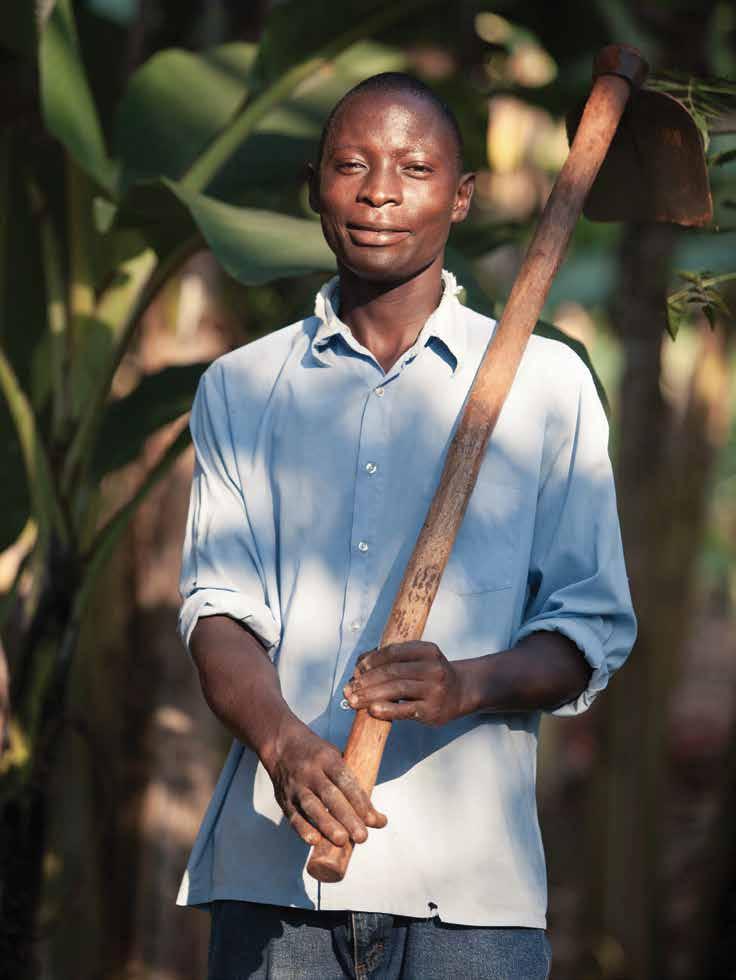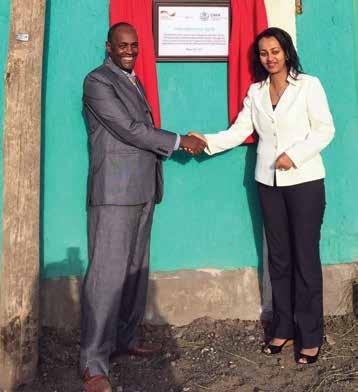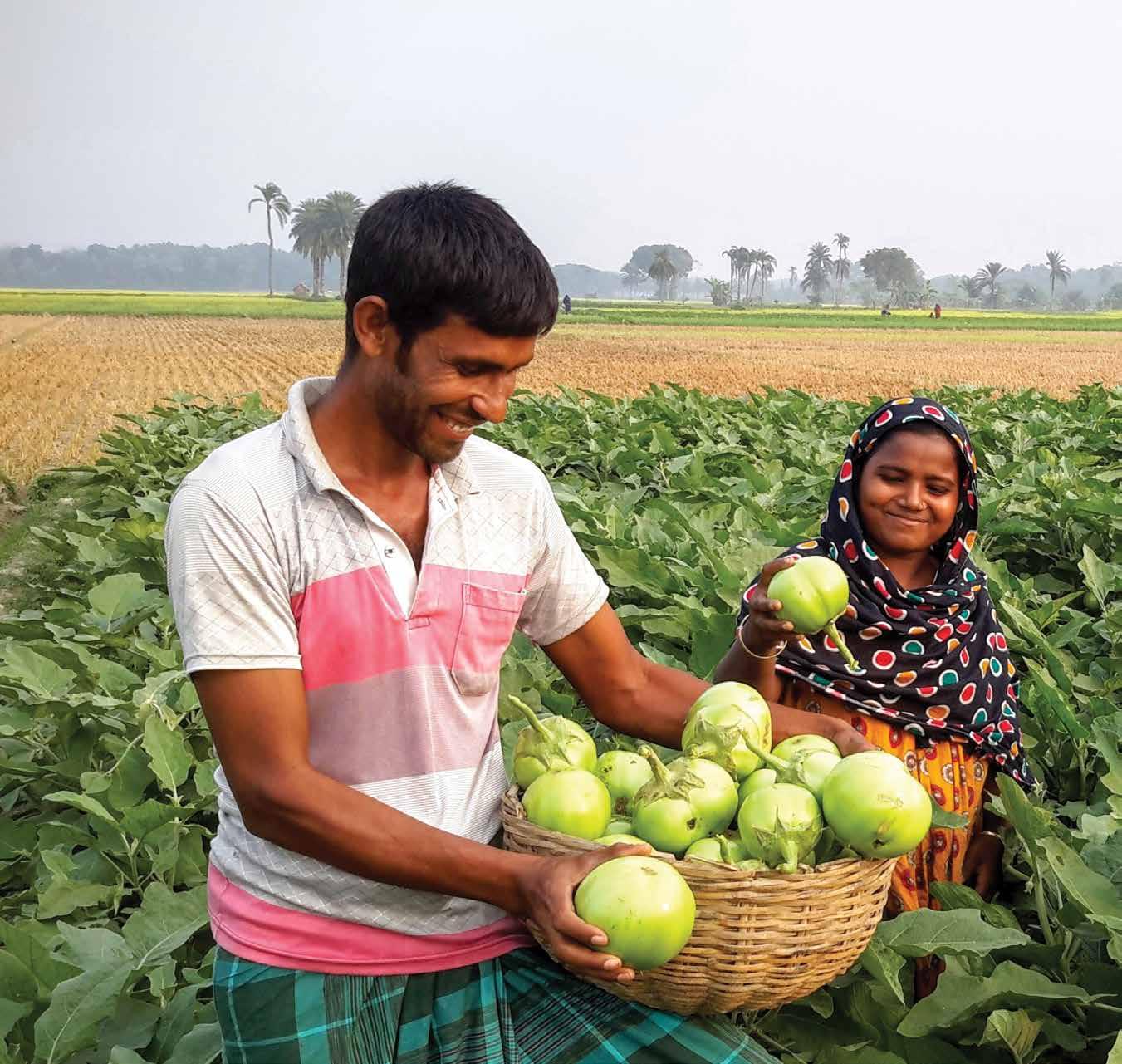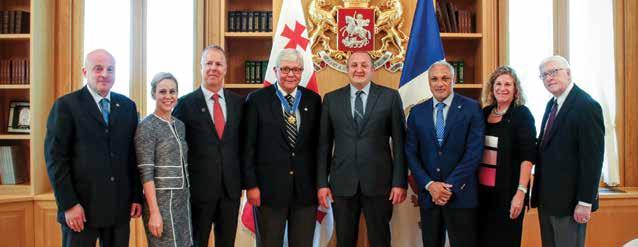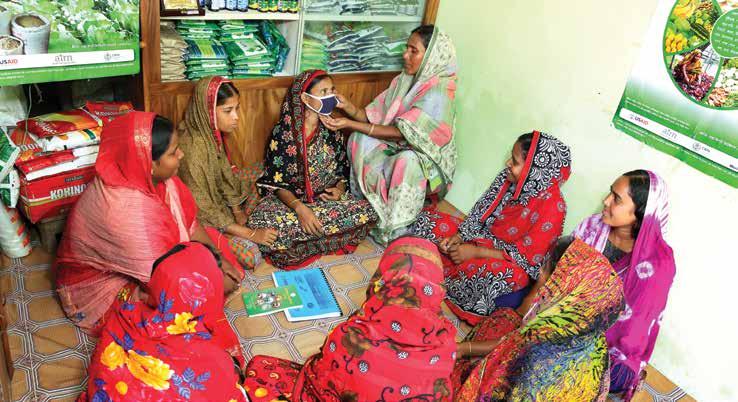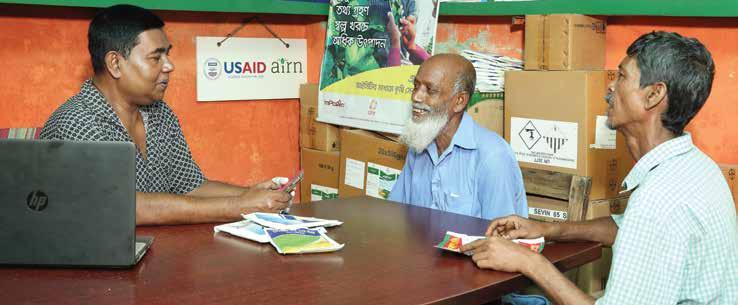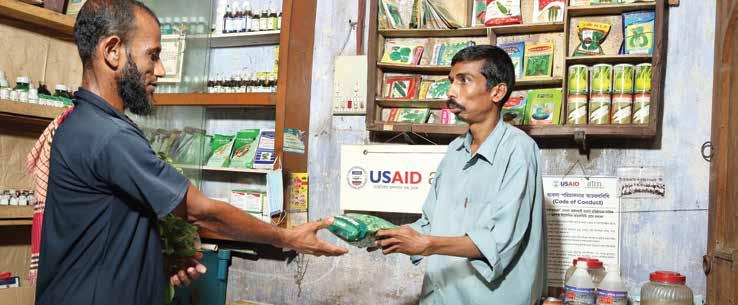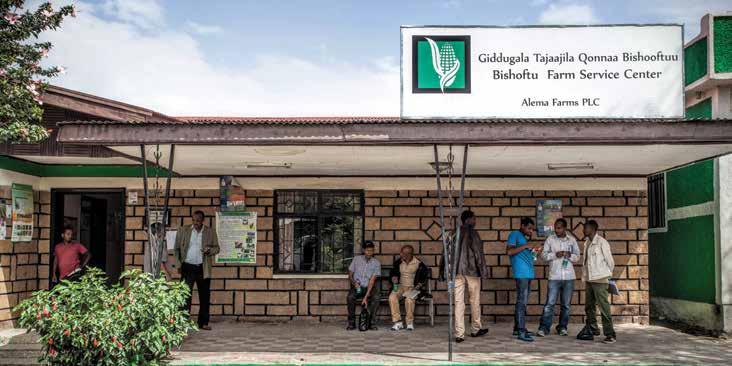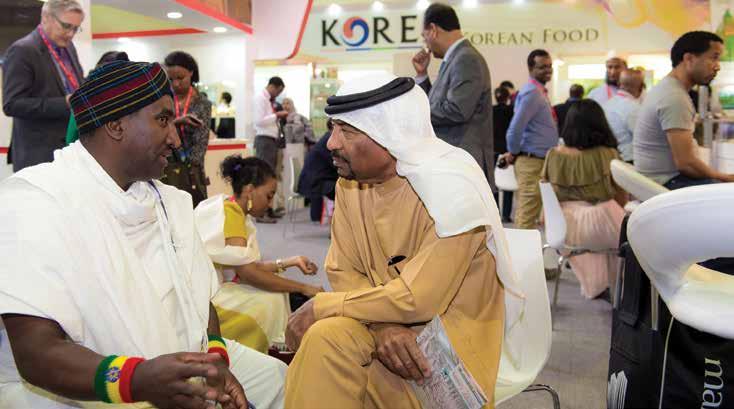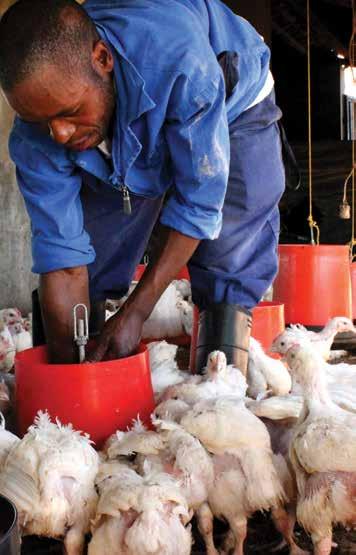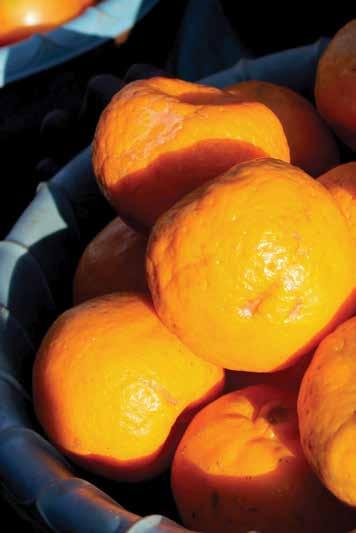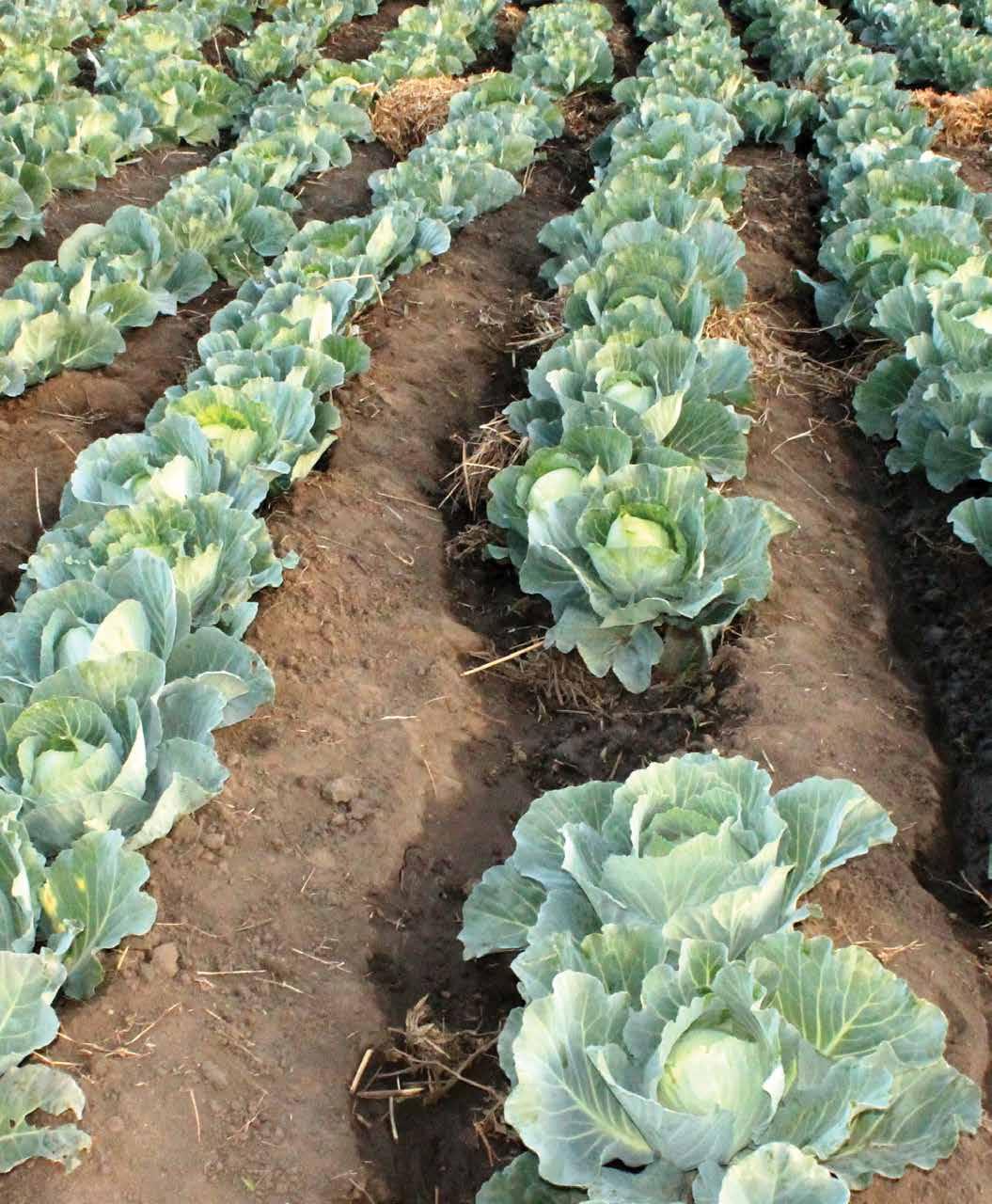JOINT LETTER BY CNFA BOARD CHAIRMAN + PRESIDENT & CEO
We are proud to say that CNFA has logged another year of success in working with farmers, agribusinesses, governments, institutions and communities around the world to help meet the growing global demand for food and secure sustainable economic growth.
In 2016, CNFA continued to build on its record of achievement in leveraging the resources, knowledge and creativity of the private sector to establish publicprivate partnerships that improve the food security and economic well-being of farm families and communities in underserved regions of the world.
We marked three key milestones:
In the country of Georgia, we celebrated our 10th year of implementing development and post-conflict recovery programs.
Giorgi Margvelashvili, Georgia’s President, awarded CNFA founder John H. Costello the nation’s highest honor for non-Georgian
citizens, the Order of the Golden Fleece, in recognition of his leadership and CNFA’s years of service to the Georgian people.
Our new Brussels-based organization CNFA Europe concluded a successful year with four new projects in three countries (Ethiopia, Georgia, Malawi). We welcome collaboration with our new development partner in Germany —the German Corporation for International Cooperation (GIZ) through its Green Innovation Centers for the Agriculture and Food Sector in Ethiopia—to extend CNFA’s signature Farm Service Center (FSC) Model in the country, by expanding a network of FSCs supplying farmers with high-quality agricultural inputs, services and training.
CNFA’s Board of Directors approved the creation and launch of a new organization to further our mission—CNFA Capital—a fund aimed at providing capital to agribusinesses, AgTech companies and AgService enterprises in developing and emerging economies.
Our successes in improving the quality of life of thousands of people are a result of the hard work and skills of our exceptional CNFA team. It is their passion, talent and commitment that have allowed CNFA to accomplish its mission, and to grow to more than 500 employees in 15 countries.
During 2016, we also ramped up efforts across our entire organization to significantly increase outreach communications that stress the importance of investing in food security to boost economic growth and enhance global security. To this end, we applaud the passage of the Global Food Security Act, which was signed into law in July 2016. The legislation solidified our country’s commitment to existing programs, such as Feed the Future. The non-partisan law acknowledges that it is in the U.S. national security interest to accelerate growth that reduces poverty, hunger and malnutrition. Funding programs that share and propagate agricultural solutions with others around the world allows us to harness one of the most time-tested, cost-effective
tools at our disposal to improve the livelihoods of all parties involved in the effort.
As we enter this new year, we once again rededicate ourselves to our daunting—but reachable—goal of finding ways to use the world’s natural resources to feed 9 billion people by 2050. By continuing to promote and implement new technologies and champion the use of better, more sustainable agricultural practices among those in underserved regions, CNFA is determined to do its part in the global effort to meet this extraordinary challenge.
SYLVAIN ROY CNFA President & CEO
JOHN J. CAVANAUGH Chairman of CNFA, Board of Directors
OUR GLOBAL REACH
Cultivating New Frontiers in Agriculture (CNFA) is a non-profit international development organization with a head office in Washington, D.C. and a European branch, CNFA Europe, based in Brussels, Belgium. Both CNFA and CNFA Europe specialize in designing and implementing sustainable, market-led agricultural, agribusiness and livestock initiatives. We work with businesses, farmers’ groups, governments and communities to build customized local and global partnerships that meet the world’s growing demand for food.
By incorporating innovative approaches into our programs and fostering inclusive development to offer enhanced opportunities to underserved groups, we create positive changes in the lives of smallholder farmers and rural entrepreneurs.
Since our inception in 1985, we have managed more than $600 million in agricultural development programs across 44 countries worldwide in Africa, Eastern Europe, Latin America and the Caribbean, the Middle East and South and Central Asia.
SOUTH SUDAN
OUR VISION A prosperous world without hunger.
OUR MISSION To stimulate economic growth and improve livelihoods by cultivating entrepreneurship.
OUR GUIDING PRINCIPLES
Foster inclusive development to offer enhanced opportunities for participation to underserved groups.
Facilitate connections with the private sector to leverage its resources, knowledge and creativity through public-private partnerships.
Develop sustainable models that respect our environment, the communities in which we work and natural systems.
Build strong partnerships and work as a team to collectively devise the best solutions.
Incorporate innovation into our programs and activities to foster new approaches and create lasting change.
Manage client funds responsibly to maximize program impact.
Continuously learn from our past programs to guide us in future endeavors, initiatives and programs.
CNFA Europe is incorporated in Belgium as an international non-profit organization. As a new, integral part of the CNFA family, CNFA Europe adheres to the same CNFA vision, mission and guiding principles, which focus on inclusive micro, small and medium enterprise (MSME) development, public-private partnerships and expanded access to agricultural technologies. CNFA Europe’s priority areas include program growth and diversification, as well as advancing the kind of field-driven innovation, thought leadership and representation that further the overall impact of CNFA worldwide.
Program Spotlights
Rural Economic Development in the Southern Regions of Georgia
Funded by the Danish International Development Agency (DANIDA) and the Swiss Agency for Development and Cooperation (SDC), CNFA Europe is strengthening the potato and dairy value chains in the southern regions of Georgia through the introduction of modern technologies, business practices, marketing tools, public awareness and promotion of internationally recognized quality standards.
Farm Service Center Project
Green Innovation Centers for the Agriculture and Food Sector
In partnership with the German Corporation for International Cooperation (GIZ) Green Innovation Centers for the Agriculture and Food Sector in Ethiopia, CNFA Europe is establishing five private retail input supply stores known as Farm Service Centers (FSCs). These Ethiopian-owned and operated enterprises link farmers in the Oromia region of Ethiopia to high-quality agricultural inputs and extension services.
Market Systems Analysis for Public-Private Partnerships in Malawi
In partnership with GOAL Ireland, CNFA Europe conducted a detailed market systems analysis in the central and southern regions of Malawi. The analysis supported GOAL’s strategic plan for Malawi, as well as its future activity development plan.
Promoting European Union Trade within Georgian Agriculture
With the support of the Embassy of the Kingdom of the Netherlands in Georgia, CNFA Europe works with Elva, a local development organization, to promote EU Deep and Comprehensive Free Trade Area standards within the Georgian agriculture sector to boost exports and access to new markets.
“My intention to invest in a Farm Service Center began when I was a Development Agent for the Ministry of Agriculture…I’m thankful and have received a lot of support from CNFA Europe, including trainings on different things such as pesticides, business management, promotion and marketing. I’m proud to say that since opening the FSC, over 534 farmers have visited, received information and purchased products from me!”
Alemu Kebede, Eteye FSC Owner
(above left-to-right) Alemu Kebede, Eteye FSC Owner, and Rebeka Amha, CNFA Europe Program Manager, at the inauguration of Alemu’s FSC.
OUR TEAM
CNFA’s staff is the most significant driver in pursuing our mission. We champion the entrepreneurial spirit at all levels and embrace the notion that bold development solutions can come from singular, sometimes unexpected sources. Recognizing this is inherent in our DNA.
Our diverse organization has grown to more than 500 employees worldwide. We are not only development experts but are also experienced business owners, agronomists and farmers. As a global team, this collective knowledge shapes and informs our work.
What truly sets our staff apart is their passion and commitment to help those we work with –smallholder farmers, entrepreneurs, women, children and youth.
OUR EXPERTISE
Sustainable Agricultural Production
CNFA harnesses a private-sector-driven and value chain approach to promote sustainable agricultural practices. We provide the assistance producers need to make their agricultural operations more economically viable so they can reach a substantial level of production to satisfy their family and community food and fiber needs.
Enterprise Development
We promote sustainable, rural-based enterprise development by targeting MSMEs to drive growth, generate higher incomes and provide new opportunities in the agricultural sector. By increasing private investment and commercial finance opportunities, we mitigate risk for rural enterprises and entrepreneurs, while expanding commercially sustainable links between producers, post-harvest enterprises, service providers, local consulting firms and end-markets.
Input Supply and Farm Services
CNFA believes that improving access to agricultural inputs and services is one of the most important ways to boost yields and help smallholder farmers move from subsistence farming to commercially-oriented agriculture. Our one-stop-shop, Farm Service Center model provides agricultural inputs, machinery services, veterinary services and products, marketing assistance for agricultural outputs, training and access to credit.
Access to Finance
CNFA improves financial access for agribusinesses and smallholder farmers by engaging both supply- and demand-side stakeholders to help clear away obstacles to obtaining agricultural finance. We work with commercial banks, microfinance institutions, village savings and credit groups and policymakers to improve their ability to design and market agricultural lending products.
Processing and Post-Harvest Management
CNFA integrates processing and post-harvest handling practices into its programs to expand the profitability, competitiveness and export capacities of food processing enterprises. Our programs ultimately help mitigate food loss while increasing rural incomes and creating new jobs.
Strengthening Livelihoods
Through a holistic and localized approach, CNFA strengthens livelihoods by improving agricultural production, helping smallholder farmers engage in new and existing markets, developing household assets, and increasing the resilience of vulnerable households. Our unique push-pull strategy moves vulnerable, subsistence farming households into commerciallyoriented, market-led agriculture.
Market Access
CNFA focuses on the demands of processors, traders and consumers to guide improvements all along the value chain. We believe that post-harvest handling practices, traceability and quality standards are essential to ensure market access at the local, national and international levels.
Our Impact
Improved the operations and profitability of
13,000 AGRIBUSINESSES
Since 1985, CNFA has Created Formed or strengthened Fielded more than
43,000+ new jobs
2,700
in 21 countries
1,590+
ASSOCIATIONS of farmers, producers & agrodealers
GEORGIA
COMMEMORATING 10 YEARS OF IMPACT
140K+ INDIVIDUALS trained John H. Costello (center left) is awarded the Order of the Golden Fleece by Georgian President Giorgi Margvelashvili (center). He is joined by a CNFA Board of Directors delegation, including (left to right) David Kirvalidze, Devry Boughner Vorwerk, Sylvain Roy, A. Michael Espy, Elin Miller, and Richard P. Reising.
Since 2006, CNFA has led or been involved with eight projects in Georgia, three of which are currently ongoing. As a result of U.S. Government assistance through USAID and the Millennium Challenge Corporation, and in partnership with the Government of Georgia, we have supported more than 430 agribusinesses, created over 3,500 jobs and trained more than 140,000 individuals.
430+ BUSINESSES supported
3,500+ JOBS created
“CNFA’s history in Georgia reflects our commitment to cultivating entrepreneurship to bring about economic growth. Whether it is helping to establish Farm Service and Machine Service Centers, supporting smallholder farmers to improve production or helping support those families most in need after the 2008 conflict with Russia, CNFA has always believed that the Georgian people have the spirit and the will to achieve great success.”
John H. Costello Chairman of CNFA Europe, Recipient of the Order of the Golden Fleece
Program Spotlights
Building a Sustainable Agro-Input Retailers’ Network in Bangladesh
CNFA facilitated the establishment of the Agro-Input Retailers’ Network (AIRN) in Bangladesh through the USAID-funded AgroInputs Project. This network of 3,000 agro-input retailer members, which includes over 200 women, serves as a first-of-its-kind inputs training and service provider. To increase farmer demand for quality agro-inputs, AIRN retailers undergo training on the safe and improved agronomic use of agro-inputs, agree to a code of business conduct and work to combat the adulteration of agricultural inputs.
“I learned about the safety and security issues of pesticides from AIRN. So I advise my farmer customers to store agrochemicals properly at home and to wear safety equipment while spraying.”
“AIRN provided training on a mobile app-based system which provides agronomic advice. With the app, I can send photos of crop-related problems and instantly receive solutions from the call center (operated by USAID). Considering the high effectiveness, these app-based solutions are becoming popular among farmers.”
Azizur Rahman, Barisal
“As a person who is physically disabled, moving to various markets to procure quality inputs supply is difficult for me. AIRN made my business hassle-free by linking me with branded agro-inputs companies and renowned dealers, which directly send quality products to my shop.”
Hafiza Khatun, Chuadanga
Khokon Kumar Dam, Bagerhat
Creating New Markets and Job Opportunities for Georgian Farmers and Enterprises
In the country of Georgia, CNFA implements the USAID Restoring Efficiency to Agriculture Production (REAP) project, which catalyzes private investment and commercial finance to the agriculture sector, mitigates risk for rural small and medium-sized enterprises and entrepreneurs, and expands commercially sustainable linkages between service providers, producers, post-harvest enterprises and smallholder farmers. REAP has partnered with 70 agribusinesses to launch new profit centers that provide input supply, services, technical training and commercial markets to smallholders.
REAP IMPACT
$6 million CO-INVESTED
$19.2 million IN PRIVATE INVESTMENT
968 NEW JOBS
$46.5 million IN NEW PRODUCTS SOLD
136,000+ farmers TRAINED
AromaProduct, one of the 70 agribusinesses partnering with REAP, buys fruits from Georgian farmers and processes them into high-quality natural juices, jams and
preserves, dried spices and other products for export to Europe, Asia and Australia. To expand AromaProduct’s business and link it to new farmers, the REAP project co-invested in the firm by launching a new packaging and labeling line and providing technical assistance to ensure its products met international quality standards. Via REAP’s strategic investment, AromaProduct has hired 17 additional seasonal staff, including 10 women, and generated more than $312,200 in annual gross sales.
Expanding Privately-Owned Farm Service Center (FSC) Networks
CNFA promotes sustainable productivity increases through its FSC Model.
FSCs are privately-owned agricultural input retailers located across Africa, Eastern Europe and South and Central Asia. Through a “onestop-shop” approach, CNFA supports retailers to supply inputs, as well as mechanization services, veterinary advice, financing and trade credit, reaching up to 20,000 farmers per FSC location.
Facilitating access to improved inputs, knowledge and tools empowers farmers to transition from a subsistence farming system to a market-oriented one, earn a living and improve food security and nutrition.
In parallel, CNFA establishes “apex” organizations that pool the resources, buying power and needs of individual FSCs and govern FSC networks, ensuring members share business interests and common branding. These “apex” organizations also allow FSC
networks to reach economies of scale, unlocking access to top-tier distributors for crop seed; volume discounts and trade credit; and negotiating power for inventory selection and delivery terms – all significantly reducing the prices paid by farmers.
CNFA’s FSC Model is adaptable and scalable. It enables donors, governments and private sector partners to integrate a
CNFA establishes networks of private input retailers that are united through shared interests, common branding and a commitment to serving smallholders. Through informal and formal cooperation, FSC networks engage collectively with multinational input suppliers to negotiate competitive prices for their farmer customers.
replicable approach into their own efforts to overcome limitations to agricultural productivity and food security.
In Ethiopia, the country’s first six FSCs, established under the USAID-funded Commercial Farm Service Program, have served more than 24,800 farmer customers, generated $1.3 million in private sector investment and sold more than $2.7 million worth of seeds, feed, fertilizers, farm implements, veterinary medicines and plant protection products. In 2016, CNFA continued to expand this FSC network through two distinct programs. Under the USAID-funded Feed the Future Ethiopia Farm Service Center Project, CNFA has partnered with the Ethiopian government’s Agricultural Transformation Agency to establish 20 additional FSCs throughout Amhara; Oromia; Southern Nations, Nationalities and Peoples’ Region (SNNPR); and Tigray. A second program—led by CNFA Europe and the German Corporation for International Cooperation (GIZ)—is building five new FSCs in the Arsi zone of Oromia
under GIZ’s Green Innovation Centers for the Agriculture and Food Sector. By 2018, these two initiatives will bring 25 new Farm Service Centers online, connecting thousands more Ethiopian farmers to improved inputs, knowledge and tools.
EXPECTED IMPACT OF FSC NETWORK EXPANSION IN ETHIOPIA
160,000+
FARMERS APPLYING IMPROVED AGRICULTURAL TECHNOLOGIES
$2.2 million INVESTED IN ETHIOPIA’S PRIVATE INPUT SUPPLY NETWORK 190 FSC STAFF, AGRONOMISTS AND VETERINARIANS HIRED
Building the Next Generation of Agro-Entrepreneurs
In late 2016, CNFA formally launched the USAID-funded Feed the Future Strengthening Agriculture Value Chains and Youth (SAVY) Program in Guinea. The Program works to improve input supply services, increase financial inclusion and facilitate thriving markets, while building the capacity of the next generation of young Guinean agro-entrepreneurs to sustain a commercialized, productive and profitable agriculture sector.
Through its AVENIR apprenticeship model, SAVY will link Guinean youth with agricultural employment opportunities, work experience and training with private sector agribusinesses, input suppliers and other value chain organizations.
SAVY EXPECTED IMPACT
$85,000+ IN AGRICULTURAL AND RURAL LOANS
640 GRADUATES OF THE SAVY AVENIR PROGRAM FOR YOUNG ENTREPRENEURS
12,000 PRIVATE ENTERPRISES, WOMEN’S GROUPS, PRODUCER AND COMMUNITY-BASED ORGANIZATIONS APPLYING IMPROVED TECHNOLOGIES AND PRACTICES
Facilitating Access to Credit for Ethiopian Meat and Live Animal Exports
Bereket Demeke owed more than 10 million Ethiopian Birr (approximately US $450k) because of a drought that caused a devastating hit to his animal export business. “I was on the verge of losing everything,” Bereket said.
But Bereket’s outlook changed after the USAIDfunded Agricultural Growth Program-Livestock Market Development (AGP-LMD) project, implemented by CNFA, offered to share the cost of his participation in the Gulfood Trade Show in Dubai. Each year, the project sponsors entrepreneurs to participate in trade shows they might never attend otherwise.
AGP-LMD supported Bereket every step of the way, helping him to prepare a sales pitch and develop high-impact marketing materials for his business. Having traveled to Dubai at his own expense, Bereket was determined to make a major sale. After several days of negotiations, he finalized a contract for his first international export of 2,000 live animals.
However, to fulfill this first contract, Bereket required a large investment of 16 million Ethiopian Birr (approximately US $700k) to deliver on the sale. Working with AGPLMD as a facilitator, he applied to USAID’s Development Credit Authority (DCA) for a loan, which DCA ultimately approved.
“That was my breakthrough,” Bereket said. “With the help of USAID and CNFA, I managed to supply the required live animals to fulfill the contract.”
(above) Bereket talks with a potential buyer at the Gulfood trade show in Dubai.
Bereket paid back the entire loan in just one year. Residents around Mojo, the community where his business center is located, have benefited significantly from his success. They now produce more livestock to satisfy the demand of Bereket’s growing business, which has generated new levels of income for local families. Bereket has also offered full-time employment opportunities to several residents.
AGP-LMD IMPACT
$92.5 million IN LIVESTOCK EXPORTS FACILITATED
$8.5 million IN LOANS ACCESSED BY DAIRY PROCESSORS, FARMERS AND FEEDLOT OPERATORS
Advancing Food Security in Liberia through Private Sector Investment
In Liberia, CNFA leads a consortium of local and international partners aiming to improve smallholder farmers’ and entrepreneurs’ access to inputs and services, while facilitating their entry into new markets.
Funded by USAID and aligned with the U.S. Government’s Feed the Future Initiative, the Liberia Agribusiness Development Activity (LADA) employs a results-driven and sustainable approach to increase private sector investment in the country’s agricultural input systems, as well as in post-harvest handling, transport and processing activities.
The project recently launched its Competitive Innovation Fund (CIF), which has already targeted investments to produce export-quality rice, to improve the capacity of cassava and animal feed millers and to provide capital to a key microfinance institution serving vulnerable smallholder farmers.
LADA EXPECTED IMPACT
$9 million IN PRIVATE SECTOR INVESTMENT LEVERAGED
483% increase IN VOLUME OF COMMODITIES WITH ADDED VALUE
Bolstering Small-Scale Poultry Producers
CNFA implements the USAID-funded Resilience and Economic Growth in the Sahel - Accelerated Growth (REGIS-AG) program in Niger and Burkina Faso to increase incomes of vulnerable households by improving the performance and inclusiveness of the cowpea, poultry and small ruminant value chains.
For small-scale poultry producers, Newcastle disease is a significant obstacle to income stability and food security. Across the West African region, the disease can kill an estimated 40-70% of unvaccinated poultry, with especially severe outbreaks occurring in the cold season when livelihoods are most vulnerable.
In targeted agro-pastoralist and marginal agriculture zones of Niger, CNFA and its partners mobilized vaccination campaigns
using the L-2 vaccine, which is effective against Newcastle, easy to use, thermostable and inexpensive.
REGIS-AG RESPONSE
1.1 million+ BIRDS VACCINATED
$4 million IN ESTIMATED LOSSES AVOIDED FOR POULTRY PRODUCERS
Boosting International Exports of Pakistani Meat, Vegetables and Fruit
(above) The U.S.-Pakistan Partnership for Agricultural Market Development has supported the export of Pakistani meat, vegetables, mangoes and citrus to Canada, Hong Kong, Indonesia, Malaysia, the Maldives, the Netherlands, the Philippines, Qatar, Russia, Sri Lanka, and the UAE.
CNFA implements the USAID-funded U.S.Pakistan Partnership for Agricultural Market Development to boost domestic and international sales of Pakistani agricultural products, including meat, vegetables, mangoes and citrus. In addition to improving technical capacity and production, this partnership promotes cooperation among farmers, processers, exporters and buyers of agricultural products. The partnership’s strategy is underpinned by a commercial and marketdriven approach with a focus on strengthening market access for its partner organizations, alongside supporting national and international marketing and sales efforts. Due to the project’s recent facilitative efforts, Indonesia rescheduled its calendar of import quotas to be better harmonized with the Pakistani Kinnow mandarin export season. This means that local exporters can send their Kinnow produce to Indonesia throughout the Januaryto-April citrus season, which was impossible
under the previous quota calendar. Exporters now anticipate sending around 500 container shipments of fresh Kinnow mandarins to Indonesia during the 2017 season. They expect the additional exports to provide a significant boost to Pakistan’s citrus sector.
U.S.-PAKISTAN PARTNERSHIP IMPACT
$10.9 million IN NEW EXPORTS/SALES CONTRACTS
Engaging in Citizen Diplomacy
CNFA’s volunteer experts, representing a wide array of disciplines from farmers to rural bankers, engage in citizen diplomacy in developing countries around the world. On two-to-three week assignments, volunteers assist local farmers and agribusinesses to improve their agricultural production, business and processing practices. Since 1991, more than 40,000 days of CNFA volunteer assistance have benefitted over 3 million people, in turn fostering learning exchanges and facilitating new economic opportunities between American and local farmers. At the heart of this volunteer experience is a dual purpose of providing farmers with professional solutions that effectively match local needs, as well as improving international understanding and relations in the agriculture sector.
VOLUNTEER IMPACT
2,700+ volunteers DEPLOYED ACROSS 21 COUNTRIES
CNFA currently implements the USAID Farmer-to-Farmer (F2F) program in Southern Africa, working in Malawi, Mozambique and Angola in the legumes and horticulture value chains, where our volunteers support rapid, sustained economic growth. Assignments train farmers’ associations on improved production and post-harvest handling techniques to boost incomes, for example, or teach cooperatives better financial management and marketing towards accessing bank loans and new markets. After an assignment is over and volunteers return to their communities, they engage in outreach via local and social media to help broaden the American public’s understanding of international development issues and the critical importance of U.S. development programs.
Since 2014, CNFA has sent Farmer-to-Farmer volunteers to:
ANGOLA: 37
MALAWI: 73
MOZAMBIQUE: 64
Equipping Farmers in Zimbabwe to Face a Challenging Climate
In 2016, Amalima, the USAID-funded Food for Peace program led by CNFA, leveraged over $2.5 million in additional funding to scale up its activities and response to the El Niñoinduced drought in Zimbabwe. The response strategy provided increased coverage to vulnerable households, asset development activities, livestock management, irrigated horticulture trainings and improved access to quality livestock feed through agro-input fairs. During the drought, evaluated districts across Zimbabwe experienced elevated food insecurity but Amalima districts showed considerably lower average increases by comparison. Districts were also able to avoid mass livestock deaths, which plagued the region during the drought.
Amalima collaborates with Zimbabwe’s Department of Agricultural, Technical and Extension Services (AGRITEX) to promote conservation agriculture. The project trains “Lead Farmers,” who teach other local farmers best practices to maximize soil fertility, increase yields and improve post-harvest handling through use of internal and external resources. So far, this effort has resulted in more than 30,000 farmers adopting climate-smart agriculture practices that increase resilience to drought. By complementing these conservation techniques with disaster risk reduction, holistic grazing and land management training and promoting higher yield small grain crops, the team has equipped farmers in the districts of Tsholotsho (Matabeleland North), Bulilima, Gwanda and Mangwe (Matabeleland South) to improve the long-term environmental and financial sustainability of farming through future adverse conditions.
AMALIMA IMPACT
30,000 farmers HAVE APPLIED CLIMATE-SMART AGRICULTURE PRACTICES THAT INCREASE RESILIENCE TO DROUGHT
11,050 community members PARTICIPATING IN ASSET DEVELOPMENT ACTIVITIES
70 productive assets BUILT OR REHABILITATED
22,300 individuals TRAINED IN IDENTIFYING DISASTER RISK AND MITIGATION STRATEGIES
BOARD
OF
DIRECTORS
JOHN J. CAVANAUGH Chairman
JOHN R. BLOCK
JOHN H. COSTELLO
A. MICHAEL ESPY
DAVID KIRVALIDZE
JACKIE KLIPPENSTEIN
ELIN MILLER
GAIL MITCHELL
RICHARD P. REISING
DEVRY BOUGHNER VORWERK
SYLVAIN ROY
CNFA President & CEO
FINANCIAL HIGHLIGHTS FY 2016
$49,022,914
Total Revenue
$48,786,605
Total Expenses
$48,242,743
Federal & Non-Federal Grant Income
$144,261
Other Income
$635,910
In-Kind Contributions
$4,090,437
Net Assets, Beginning of the Year
$4,326,746
Net Assets, End of the Year
